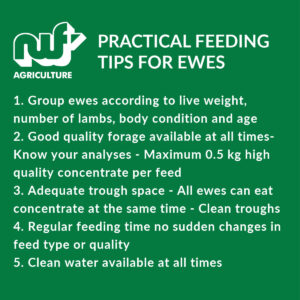With tupping well underway it is important to remember the first few weeks post tupping are critical for embryo development. It is important ewes are maintained on the same plane of nutrition with minimal dietary changes, stress from handling or inadequate nutrition must be avoided to reduce embryo mortality.
Looking forward to lambing, in late pregnancy (6 weeks prior to lambing) 75% of foetal growth occurs, this corresponds with the increase in the ewe’s requirement for energy and protein. The biggest challenge in meeting this energy increase is the lamb growth causes the ewes Dry Matter Intake (DMI) to drop up to 30% resulting in a DMI as low as 1.4 Kg. Feeding High energy Ewe feed such as Ewetrition Rolls or Champion Ewe Nuts help to meet the nutrition requirements of ewes.

When ewes have a deficit in energy, they mobilise back fat which is metabolised in the liver. If excess back fat is mobilised the liver can become overworked and appetite declines further. This can lead to pregnancy toxaemia, hypocalcaemia, lower milk yield and increased lamb mortality. Most mammary gland development also occurs in the last month of pregnancy, under-nutrition can reduce colostrum quantity, and delays onset of lactation.
Colostrum is essential for immunity. Lambs require 50ml/kg (of birth weight) of colostrum within the first 6 hours of life as the ability of the gut to absorb immunoglobulins into the bloodstream reduces after this time. Within 24hours, lambs should receive 200ml per kg (of birthweight), As a guide an optimum birthweight for twins is 4-5kg per lamb (reference feeding the ewe).
For anymore information on Rationing Ewes, please get in touch with our Technical Team on 0800 262397 or alternatively, nbteam@nwfagriculture.co.uk

